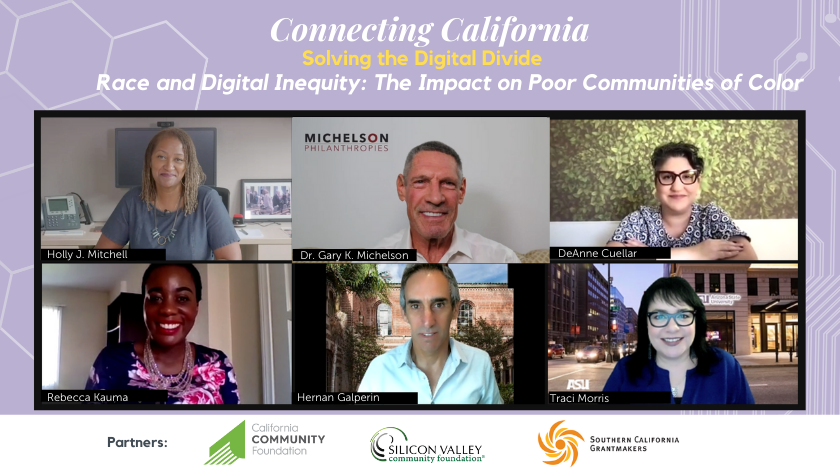By Miguel Leon
On September 23rd, 2021, the Michelson 20MM Foundation, in partnership with the California Community Foundation, the Silicon Valley Community Foundation, and Southern California Grantmakers, hosted “Race and Digital Inequity: The Impact on Poor Communities of Color.” The discussion focused on how digital inequity continues to perpetuate intergenerational poverty among poor communities of color by disenfranchising them, limiting their access to health care and education, and stifling economic opportunity and growth. The event featured extraordinary digital equity leaders who explored the intersectionality of the digital divide and the racism entrenched in this issue.
Opening Thoughts from Our Leaders
Dr. Gary K. Michelson, founder and co-chair of the Michelson 20MM Foundation, kicked off the conversation by stating, “COVID has underscored that the most troubling elements of the digital divide appear to be rooted in systemic racial injustices that have deep roots, and are pervasive… Whether we are considering infrastructure deployment or policy interventions, this is the right time to be having a conversation about the role of racism in the digital divide.”
We were honored to have Supervisor Holly Mitchell, who proudly represents L.A. County’s Second District, as the keynote speaker. An equity champion since her time at the state legislature, Supervisor Mitchell set the framework for the conversation by reminding us that digital inequity is a vicious cycle of exclusion, the same injustice that has impacted our communities in the form of segregation, redlining, and systemic racism. She urged us to crush the digital divide expeditiously and implored all partners to take action, especially on the current California Public Utilities Commission (CPUC) rulemaking process that determines how California’s recent $6B investment in broadband will be spent. She urged everyone to get involved to ensure that the rulemaking process favors our community and accelerates our collective efforts to close the divide.
Words of Wisdom From Our Experts
The panelists then discussed the racist roots of the digital divide and how the intersectionality of this issue begs for access to broadband to be considered a social determinant of health. They also highlighted how they incorporate race equity into their own digital equity work.
Rebecca Kauma, Economic and Digital Inclusion Program Manager at the City of Long Beach, urged attendees and practitioners to consider digital inequity from a macro standpoint, understanding that it’s rooted in our country’s history of institutional and systemic racism and oppression. American Indian Policy Institute Executive Director, Dr. Traci Morris highlighted that the 574 federally recognized tribes in the United States have experienced more than redlining: They’ve experienced digital indifference. In order to counter this digital indifference, tribes need a seat at the table when the government designs digital equity solutions. Furthermore, Dr. Hernan Galperin, Associate Professor at the USC Annenberg School for Communication and Journalism, stated that digital inequity is part of an overarching underinvestment in public infrastructure in poor communities of color. Our moderator DeAnne Cuellar, Texas state program director at Older Adults Technology Services, uplifted the need for long-term solutions to solve digital inequity in poor, marginalized communities of color.
Let’s Be Bold and Courageous
Over the past year and a half, COVID-19 brought many inequities to light, and digital inequity is no exception. The pandemic forced those who have not experienced digital inequity firsthand to confront the reality that Black, Latinx, and Indigenous communities experience on a daily basis—and for generations—including inadequate and failing health systems, unprepared and struggling education systems, and a stagnant economy with seemingly no opportunities for economic growth. To tackle these challenges, we must heed the words of Supervisor Mitchell, “Let’s be bold and courageous because this issue can’t wait for us to show up any other way.”
If you would like to learn more, we invite you to view the recording, read the full transcript, and access additional resources mentioned during the event.
If you’d like to engage in the digital equity policy conversation taking place in California, visit the California Public Utilities Commission to submit public comments on the state’s current rulemaking process.
Michelson 20MM is a private, nonprofit foundation seeking to accelerate progress towards a more just world through grantmaking, operating programs, and impact investing. Co-chaired and funded by Alya and Gary Michelson, Michelson 20MM is part of the Michelson Philanthropies network of foundations.
